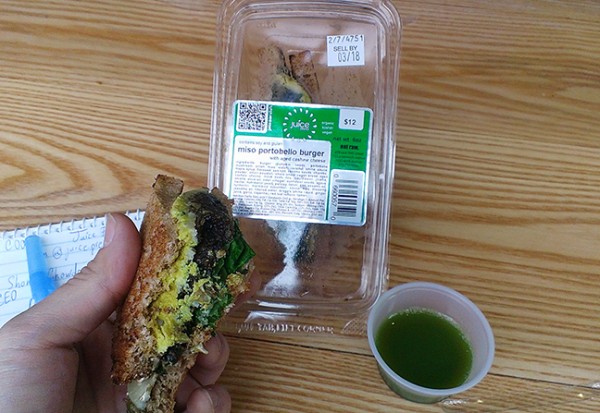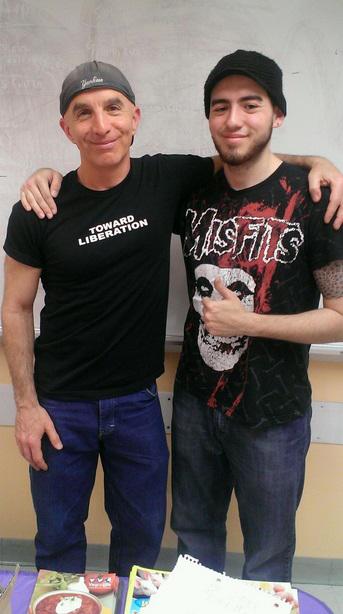by Roberto Miranda

If a person does not eat meat, let alone, use any animal products altogether, then what are they: a vegetarian? a weirdo? a Hipster? or a non-conformist?
Twenty seven year-old Travis McWhorter, a laborer and student from Sandia Park, New Mexico can relate. “Since I work in a macho, manual-labor type of environment, I am constantly criticized for the way I eat, by people who drink six cans of soda a day. I see them, at 21 years old, complaining of aches and pains and how tired they are, [and] look at their diet; and then I look at the way I eat, how much harder I can push myself, and yet, I’m six years older than them. So really, their opinions roll off my back. I’m the one that feels healthy inside and out at the end of the day.”
Call them vegans: a person who does not consume any animal-based foods. This isn’t just, “not eating meat,” like a vegetarian does, or immersing in a “diet” that defies all genetically processed rubbish; this is a lifestyle.
It wasn’t until the 20th century that groups of people became more known for being more body and animal conscious; thus, the Vegan Society began in 1944, when the term “vegan” officially originated to categorize people who practiced these ethics.
It wasn’t until 1994 that vegans had a day to themselves; November 1st, 1994 was the first celebration of World Vegan Day, a day where people who don’t eat products such as meat, eggs, cheese, mayonnaise, gelatin, honey, or whey can embrace their culture. Furthermore, veganism pertains to more than just a diet. Some vegans are sure to resist “any clothing, accessory or object made from an animal, no leather, no wool, no pearls, [and] no ivory-keyed pianos,” according to Time’s article, “A Brief History of Veganism.”
Being that veganism can be perceived as uncommon and demanding, it’s no surprise that it isn’t completely dominating the food industry. Ask your typical carnivore or better yet any person who knows just a bit about what actually goes into their food and you’ll probably hear something like, “I know meat and dairy are results of animal food processing, but they taste so good! I can’t imagine my life without them!” With that being the nonchalant response of majority of Americans, one can imply that these people have little to no interest in eating ethics that go back to practices of early religions.
According to “A Brief History on Veganism,” “Vegetarianism is first mentioned by the Greek philosopher and mathematician Pythagoras of Samos around 500 BCE. In addition to his theorem about right triangles, Pythagoras promoted benevolence among all species, including humans. Followers of Buddhism, Hinduism, and Jainism also advocated vegetarianism, believing that humans should not inflict pain on other animals.”
————————————————————————————————————
So what do the vegans of Hudson County and neighboring areas have to say about this lifestyle? How did they get started?
“My mom likes to tell the story of when they went out for their anniversary,” said Susannah Goya-Pack, 24, from Jersey City. “When I was about two years old, and they ordered a lobster, which they very rarely did, and I pointed at it and said, ‘Dead Animal!’ So I’ve always been into being very vegetarian; we had a lot of pets growing up, and I felt like I saw no difference between my pets and animals that are consumed for food.”
Much like Mrs. Goya-Pack’s case, being vegan doesn’t happen overnight. People don’t just wake up and say, “Good thing I filled out my vegan application on Monster.com, because ‘Today’s the day!’” Rather, it seems to be a choice based on years of finding out what goes into the everyday processed, White Rose, America’s Choice, or a lethargically creative, yet aptly named food product, in an attempt to support health-conscious and ethical reasons.
“I’ve been vegan for about four years now,” said Anthony Petrucelli, 23, from Bayonne. “In the beginning, I went vegan because of the cruelty behind our food industry. I went to get my first vegan specialty meal, [and] if I didn’t like the food, I was not going to do it. The food was awesome, so I decided I could do it. In the beginning, health wasn’t my main objective, but it slowly took priority as I learned about the lifestyle. After, I slowly transitioned from my typical American diet, to vegetarian, to vegan, to healthy vegan. Overall wellness was my point.”
Aside from not consuming meat any animal-derived foods, veganism, in some cases, pertains to the resistance of using household products and clothes as well.
Since vegans do not consume animal flesh, there is an undeniable misconception that vegans are not “getting enough protein.” For anyone oblivious to reading nutrition labels, nuts, almonds, beans, and vegan-friendly nutritional supplements can help a vegan meet their daily requirements.
However, if there is something vegans cannot get through food, it is the daily requirement of vitamin B12 and omega fatty acids. The site “Vegan Health” states that “Vitamin B12 has been said to be unavailable, so supplementation might also be required for it. Plant-based omega 3 fatty acids can be found in flaxseed oil, walnuts, soybeans and mungo beans. Also linseed oil, canola oil, walnut oil and wheat germ oil contain them.”
When asked about alternative vegan diets, Petrucelli said “plant based veganism, raw veganism, macro vegan, and the list goes on.”
HappyHerbivore.com defines a plant-based diet as “a diet that focuses around plant foods: fruits, vegetables, legumes, grains, nuts and seeds, and zero animal products. No meat, fish, butter, milk, eggs, cheese, gelatin or other animal by-product.”
Despite its definition, most vegans come to identify themselves with the term to explain the reasoning of their diets in a minimalist fashion, by saying that they practice a “plant-based diet.” However, Goya-Pack explains how ethics plays a difference between people who eat foods identified as “vegan” (used as an adjective here), and those who are less concerned about ethics will follow a plant-based diet, yet still perform actions not usually affiliated with veganism.
“My [initial] reasons for being vegetarian are completely about animal rights, and animal welfare,” said Goya-Pack. “The conditions of factory farms are not good for the animals; in fact, they’re very bad. However, if someone is vegan for health reasons, it tends to be called “plant-based” diet; because veganism has to do with ethics. You can eat no animal products and not be vegan. Some vegans get very up-in-arms about it, but I think that’s perfectly fine for some people who are following a plant-based diet too, will say that they are ‘vegan;’ it just simplifies things. Someone who’s following a plant-based diet, but isn’t necessarily vegan may still wear leather, or suede, or use wool (or even hunt!), but, they’re not gonna care about gelatin, stuff like that; whereas, a vegan who’s doing it for ethical reasons, for not exploiting animals, will avoid those things.”
So a vegan (noun) doesn’t necessarily have to avoid animal products at all cost, but those who take the adjective use of “vegan” in their biography, will be more than likely to do so, especially since they’re aiming for optimal practice of their ethics.
————————————————————————————————————

Located just a few blocks away from the 14th Street PATH Train, a Goosebumps-green refrigerator, similar to that of an illuminated H&R Block preparer’s office during tax season, can be seen through the glass door and under the words “Juice Press.” Upon first glance, the words “Vegan” create a ubiquitous sense of both physical and ethical awareness. There are patrons of all heights and thin body types entering and exiting what appears to be an eco-friendly Starbucks of the future. However, there’s no “Lady Gaga-like” woman representing the image of Juice Press; rather, there is a black backdrop with a singular white mandala-like pattern of lemon pulp surrounding the words “Juice Press.”
A set of tables is on the left, in front of the radiant fridge; it glows with a variety of all-natural juices, $12 miso Portobello burgers made of aged cashew cheese, and assorted arrangements of vegan sweets.
To the right-center, there is a register, a stack of random, hybrid flavored vegan friendly chips, and a small group of visible kitchen workers directly behind the register. All cashiers have a combination of slim-fitted green and black Juice Press hats and shirts, clear skin, and chiseled jaw-lines; not surprisingly, they all seemed to be as informative as what most people would call the “scare tactic” brochures that contain images of animals that are captioned with persuasive, profound text.
This is Juice Press, an ever-expanding vegan restaurant for the body conscious community.
Their website, Juicepress.com, is nothing short of an encyclopedia promoting the health benefits of veganism; their mission statement offers detailed insight on the health benefits:
“All energy that fuels your body comes indirectly from the sun by way of plants. Plants absorb the sun’s energy in their tissue. When you consume plant based foods such as fruits, vegetables, nuts, sprouts, and seeds, you receive the sun’s energy that these plants have stored.
When you eat flesh foods you are eating matter in a more concentrated form, which contains energy that came originally from the sun. In addition to the nutrition that may be in flesh foods, you are also ingesting the toxins in the flesh and blood of the animal at the time of its death, i.e., waste gasses. Flesh foods are more concentrated matter and therefore require enormous digestive forces to break down into usable nutrients for fuel and tissue re-growth. Vegetation is the prime source of all nutrition, including vitamins, minerals, carbs, water, fat, and yes, protein. Vegetation is clean nutrition without the toxins of flesh to push through your system.”
So it’s a given that better nutrition will lead to health benefits, and thus, a more fit, healthier body. This goes for anyone, whether omnivorous or vegan, depending on their eating habits and exercises of course.
———————————————————————————————————————————
It is now 2014. Social media is constantly reminding people of their image, and it seems like a person looking to improve their looks via weight loss should be immersing themselves with the best nutrition possible: an active, nutritionally healthy vegan diet. Despite this notion, several vegans emphasized the impact of social media on their veganism in more of an ethics meets new recipe-related context, rather than a health and image-based one.
“I follow pages on Instagram about veganism to learn a little bit more,” says Francisca Montenegro, 21, North Bergen. “They have a lot of recipes there, and it’s nice to see a real life, -instead of going to do research, just looking- to see someone that’s a real life person actually doing it. So that’s kind of like, ‘If someone else could do it, I could do it as well.’”
Much like Montenegro, Goya-Pack acknowledges social media’s ties to veganism.
“In vegan social media, there tends to be two things going on: there tends to be the animal-rights, and there tends to be the tasty food,” says Goya-Pack. “Sometimes people come for one and stay for the other. So you’re going to get drawn in by ‘Oh, those cookies look good! And they’re vegan? Okay,’ and they’ll realize, ‘Oh, it’s good that I’m actually doing this because of animal rights,’ or, they’re going to say, ‘Oh well; I’m here because I care about animal rights, but these recipes are also really good.’ On Tumblr, [I’m] seeing just a lot of healthier recipes or food ideas, and remembering that I actually like vegetables. I haven’t perfected a vegan mac n cheese yet, but I’m working on it. A lot of the other vegan recipes require a food processor, and I just don’t have a good one. I [also] found my way to a few more vegan blogs, on Tumblr. And seeing those gave me more ideas, as well as the vegan community on Reddit.”
It’s no surprise that the internet has helped raise the awareness of veganism’s health benefits. Anyone unfamiliar with the term could simply “Google” whatever it is they’re searching for; yet, the ethics, and the motives behind the actions, are the real catalysts.

“Majority of why I do it [is] more for my health, but now that I’m looking up more information about veganism, I’m mostly looking up how they mistreat animals,” says Montenegro. “Now, I’m thinking of buying vegan makeup, and so like, little by little, I’ll try to transitioning to that [vegan that excludes all animal products]; but right now I’m taking it slow. I just don’t wanna go completely overboard and then fall off of it.”
Perhaps the most credible of all vegans is the one holding a microphone with a devoted following. Mickey Z, a vegan activist living in Astoria Queens, has been a vegan for 19 years and recently lectured at Hudson County Community College, located in Jersey City, NJ.
“I find that when people go vegan initially, you almost become evangelical about it because it’s like you found this amazing news and it’s like that’s where ‘the annoying vegan’ stereotype comes from (laughs). But, to me, and I said this to some folks earlier, it’s the ethical component that keeps me on the straight and narrow because I will have a slice of this cake when I’m done, and I’m sure there’s a fair amount of plant-based sugar in there, so, it isn’t about purity. If I only was doing it for health reasons, and if I were out with friends and the only thing around is a slice of pizza, then why wouldn’t I have one slice? If it was just about me. But, if you make it about the planet, and about your fellow earthlings, you just can’t do it.”
And it seems that this is what veganism is focused on: optimal animal rights. Veganism isn’t just about following a strict diet in an attempt to defy the incessant malevolence behind your local meat-is-murder fast food conglomerates; it is a commitment. It is another way of living that once encountered becomes a possible new glowing mirror for those concerned about animals; and, if a vegan is active and well-nourished, their bodies will benefit and the reflections will speak for themselves.
Sidebar: Veganism Misperceptions
Sidebar: My Experiences Pertaining to Veganism




